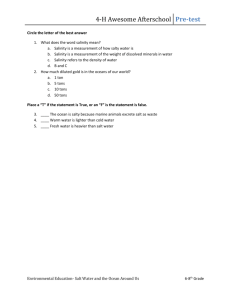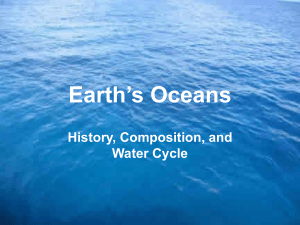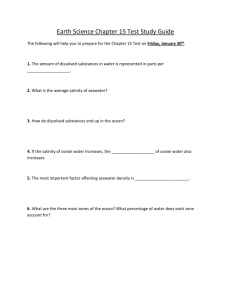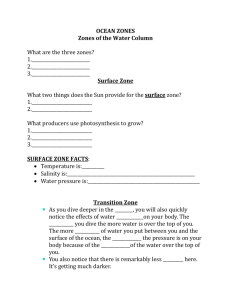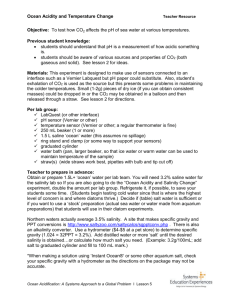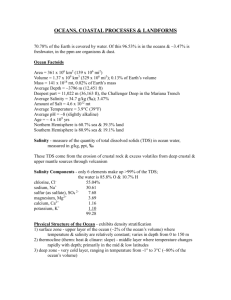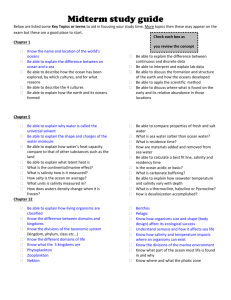Characteristics of Ocean Water
advertisement
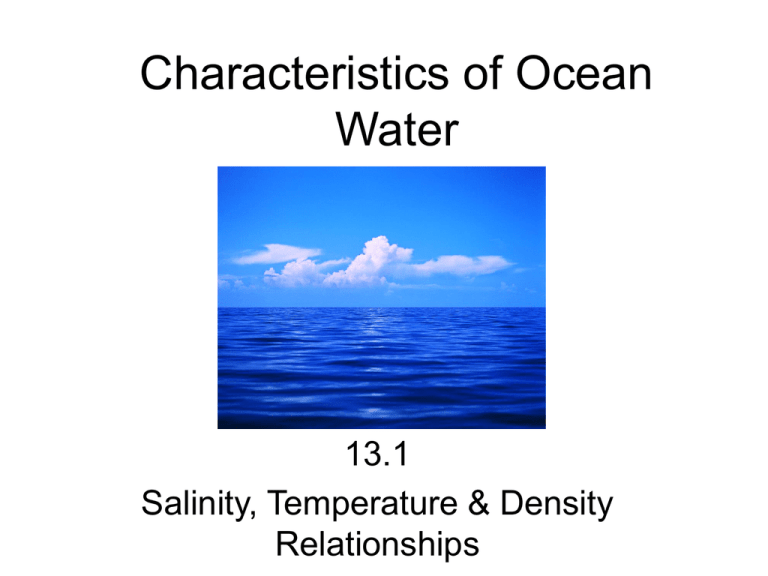
Characteristics of Ocean Water 13.1 Salinity, Temperature & Density Relationships How did the oceans form? • About 4 billion years ago Earth began to cool off. • Cooling allowed water vapor to condense. • Rain fell & filled in the deep spots on earth. • Presto…you’ve got an ocean! But why is ocean water salty? FACT: • NaCl is the main salt in the ocean. • So…where does the salt come from? – Sodium = dissolved from rocks – Chlorine = gas added from volcanic eruptions How is the salt measured? • Salinity is defined as the “total amount of dissolved material” in the water • Measured in parts per thousand ‰ • Typical measurement 33 – 37 ‰ Is it the same saltiness everywhere? • No! Evaporation and precipitation affect how much salt an area contains. • So…hot & dry coastal areas are saltier (higher salinity = 38‰). • Why? There is more evaporation and little freshwater running into the oceans here. Where is it less salty? • Cool climates and more humid areas will have a lower salinity (32‰). • These areas have more freshwater that runs into the ocean and dilutes the seawater. Movement affects salinity. • Slower moving waters can become saltier, since there is less mixing. • An example is the Mediterranean Sea. • Mixing decreases salinity. Temperature & Oceans • Ocean surface temperatures are usually about 30°C at the equator. • Ocean surface temperatures are about 2°C at the poles. Temperature zones • There are three temp. zones in the ocean: – Surface zone 0 – 300 m deep • Sunlight heats the top • Surface currents mix this layer – Thermocline 300 – 700 m deep • Temps drop very fast here – Deep zone 700 m to bottom • Temps are usually 1°C to 3°C …brrrrr! Florida International University Website: http://www.coexploration.org/bermuda/html/thermocline_graph.html Density • Mass/unit volume • Pure water is 1g/cm3 • Salt makes the water heavier (more dense) • Ocean water is 1.026 g/cm3 • Freshwater floats on saltwater! • Evaporate 1 ft3 of seawater and you have 2.2 pounds of salt leftover! Think about the Pamlico Sound • Where is the salt water? • Does the salt water ever reach New Bern? • What happens when less water flows downstream? • What happens when more water flows downstream? Density…it makes a difference! • Higher salinity = higher density • Colder temps = higher density • So the most dense water would be cold with high salinity. • The lowest density water would be warm with low salinity. Seasonal Changes in Ocean Temps • Why do we have to wear wetsuits to surf in NC during the winter? • Because the water is colder! • Why? • Because we receive less direct sunlight during the winter. • We receive more direct rays during the summer, so the water is warmer then.
